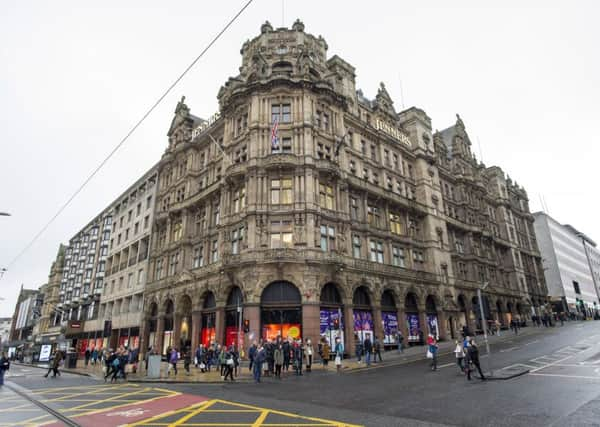Bill Jamieson: Start-ups betray weak pulse of the economy


But recent data on business start-ups is contradictory and in some cases counter-intuitive. Much depends on the time scale of the surveys taken, the size of the sample and the data sources. And in Scotland there are worrying signs of a weakening business start-up rate.
However, I was heartened to read a survey from a prominent small business lending and support group last week showing (as the headline had it) “Ever growing entrepreneurial ambitions – 9.3 million working British workers planning to become their own boss”.
Advertisement
Hide AdAdvertisement
Hide AdReally? Could these downbeat macro-economic forecasts of subdued growth be wrong? Might the dreaded curse of “Brexit uncertainty” be starting to lift at last? Are on the cusp of a micro business surge?
The survey, by the Aldermore banking group, found that almost three in 10 British workers (29 per cent – the equivalent of nine million people) aim to become self-employed in the future – up from 15 per cent in 2017. One in seven (15 per cent) plan to launch a business in the retail sector, closely followed by the catering and accommodation industry, which just over one in ten (11 per cent) plan to enter.
There are few forces more potent than the enthusiasm and blind faith of the start-up entrepreneur – the intoxicating belief that their business dream cannot but succeed. But a perusal of recent business headlines must give all but the most foolhardy pause for thought. The retail sector in particular has been going through a torrid time, from giants such as BHS and House of Fraser to Jaeger, Juice Corporation and Palmer and Harvey. Indeed, since 2007 more than 25,000 high street retail businesses have gone bust, hit by a combination of squeezed consumer spending power and the relentless march of online trading. Barely a month passes without a howl of anguish from the British Retail Consortium and its Scottish counterpart over miserable sales figures.
And who does not know of a bijou restaurant business, launched with a flourish in year one, the menu (and staff) cut back in year two – and the For Sale sign hung out in year three?
The Aldermore research, based on a survey of 1,002 self-employed adults, does admit to the downside of start-ups: over four in ten (44 per cent) were worried about not having a regular source of income, and almost two-fifths (38 per cent) were worried about an irregular volume of work. These concerns are proven; half of those already self-employed have experienced irregular income and two-fifths have had to deal with inconsistent cash flow. Other difficulties encountered by the self-employed are late payments from clients (37 per cent), as well as a lack of free time (21 per cent). The self-employed have also cited difficulties trying to secure a mortgage.
Since the recovery from the 2008-09 recession, the start-up story across the UK has been strongly positive, helped by support from organisations such as Start-Up Britain. ONS figures show that in 2016 the number of business births rose from 383,000 to 414,000, a rise from 14.3 per cent of businesses to 14.6 per cent. Although business deaths were also up, from 283,000 to 328,000, or from 10.5 per cent to 11.6 per cent.
The improvement in the business birth rate was due, the ONS said, to increased employment and strengthening of the labour market. Lower interest rates, further reduced financing costs.
But more recent data points to a distinct fall in momentum. Last year business start-ups UK-wide fell more than 10 per cent to just over 589,000, according to figures from the Centre for Entrepreneurs (CFE) think tank. Data from Companies House showed 589,008 new businesses set up shop in 2017, down from 657,790 the previous year – the first drop in business launches since 2010.
Advertisement
Hide AdAdvertisement
Hide AdThe CFE’s analysis suggests this was caused in part by the government’s clampdown on so-called “disguised employment” among public sector workers. The measures, which stopped businesses from being classified as contractor accounting firms to avoid tax, came into effect in April 2017.
Here in Scotland the business birth rate figures not only continue to trail the rest of the UK, but have also been showing a weakening absolute trend. Recent figures showed the gap in Scotland between the number of businesses created and the number failing each year pointing to the lowest business growth rate in the UK.
A total of 22,000 businesses were created in Scotland in 2016, equivalent to 12.4 per cent of the 178,000 business universe. However, this proportion was the second worst in the UK – only Northern Ireland was worse, with a start-up rate of 10.2 per cent.
The figures echoed the observations of Hugh Lightbody, head of Business Gateway, in its 2015-16 annual review. Indeed, while the ONS cited strong employment growth as a factor behind the growth in start-ups, “the robust employment and labour market in Scotland in 2015/16”, writes Lightbody, “appears to have reduced the level of interest in self-employment and starting new businesses”. Labour Force Survey statistics showed there were 14,000 fewer people in self-employment in 2015 than in 2014. Business Gateway has seen a corresponding fall in the number of start-up businesses supported in 2015/16 – nationally 9,087 businesses were helped to start trading, down from 10,103 in the previous year.
In the big macro picture of the UK economy, does small business matter that much? The sector employs 2.2 million more than in 2000 and accounts for 99.3 per cent of all private sector businesses at the start of 2017. Total employment in SMEs is just over 16 million – 60 per cent of all private sector employment in the UK. And the combined turnover of SMEs at £1.9 trillion represents 51 per cent of all private sector turnover in the UK.
Its health and vibrancy is critical – and in Scotland as much as the UK overall.